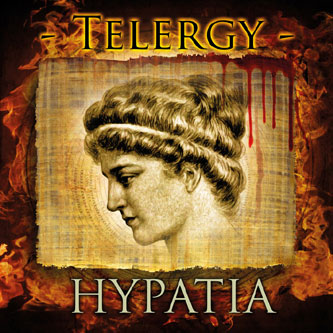 Multi-instrumentalist
/ guitarist and composer Robert McClung returns in 2015 with
a new Telergy album called Hypatia. Telergy
loves a musical challenge and the subject of of Hypatia is
about the ancient Greek scholar Hypatia of Alexandria. With the odd
numbered tracked retelling stories of her recorded wisdom, the even
numbered tracks are lengthy instrumental rock fusion jams that simply
spark with energy and ideas. One of the year's best albums of instrumental
progressive rock, Hypatia features Robert McClung backed up
in the studio by a number of world class musicians including Oliver
Wakeman and Oliver Palotai (keyboards), David Ragsdale
and Anna Phoebe (violins), along with string players, bassists
and drummers and all sorts of musicians from bands such as Supertramp,
Kansas, Jethro Tull, Symphony X and more. Speaking to mwe3.com about
his musical mission in Telergy, McClung explains, "I
think the statement I try to make with every Telergy album is similar.
The way humans treat each other is often a travesty. The Israelites,
Goody Cole, Hypatia… These were all people who did nothing wrong.
Yet they were persecuted, enslaved, tortured and murdered. I would
like to hope that by examining these histories, people can start to
examine what it truly means to be human, and stop hurting each other."
In
addition to featuring his compositional skills, Hypatia is
also a solid showcase for McClung’s guitar chops, which are very
much steeped in the finest traditions of progressive rock and hard
rock. Some of the riffing here would quickly appeal to fans of Deep
Purple and Dixie Dregs and world class bands specializing in instro-metal
music. Depicting a fascinating story line, the superstar strewn Hypatia
is everything a prog-rock record should be. www.TelergyMusic.com
Multi-instrumentalist
/ guitarist and composer Robert McClung returns in 2015 with
a new Telergy album called Hypatia. Telergy
loves a musical challenge and the subject of of Hypatia is
about the ancient Greek scholar Hypatia of Alexandria. With the odd
numbered tracked retelling stories of her recorded wisdom, the even
numbered tracks are lengthy instrumental rock fusion jams that simply
spark with energy and ideas. One of the year's best albums of instrumental
progressive rock, Hypatia features Robert McClung backed up
in the studio by a number of world class musicians including Oliver
Wakeman and Oliver Palotai (keyboards), David Ragsdale
and Anna Phoebe (violins), along with string players, bassists
and drummers and all sorts of musicians from bands such as Supertramp,
Kansas, Jethro Tull, Symphony X and more. Speaking to mwe3.com about
his musical mission in Telergy, McClung explains, "I
think the statement I try to make with every Telergy album is similar.
The way humans treat each other is often a travesty. The Israelites,
Goody Cole, Hypatia… These were all people who did nothing wrong.
Yet they were persecuted, enslaved, tortured and murdered. I would
like to hope that by examining these histories, people can start to
examine what it truly means to be human, and stop hurting each other."
In
addition to featuring his compositional skills, Hypatia is
also a solid showcase for McClung’s guitar chops, which are very
much steeped in the finest traditions of progressive rock and hard
rock. Some of the riffing here would quickly appeal to fans of Deep
Purple and Dixie Dregs and world class bands specializing in instro-metal
music. Depicting a fascinating story line, the superstar strewn Hypatia
is everything a prog-rock record should be. www.TelergyMusic.com
mwe3.com presents an interview with
Robert McClung of TELERGY
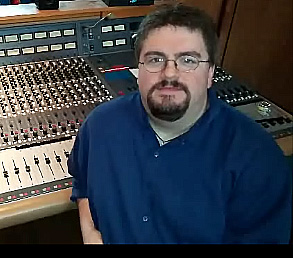 mwe3:
Where are you from originally and where do you live now and how would
you best describe it? Tell us about life up in New Hampshire. Is winter
on the way?
mwe3:
Where are you from originally and where do you live now and how would
you best describe it? Tell us about life up in New Hampshire. Is winter
on the way?
Robert McClung: I was originally born in Ohio, but my family
moved to New Hampshire when I was young. I feel very blessed that
I live in, what I feel is, one of the most beautiful and diverse places
in the world. I live right on the ocean. The beach is my back yard.
I’m only a two hour drive from the mountains. And only a forty
five minute drive from the great city of Boston. There is an abundance
of art and culture, and music scene is thriving! I can’t imagine
living anywhere else.
Although, being in this area does come at a price, and winter is indeed
on the way. Last year was particularly harsh. We were hit with blizzard-like
storms several weeks in a row. There was so much snow we ran out of
places to put it. Every parking lot had massive mountains of snow
at the end. We lost many days of school and public transportation,
any transportation really, came to a total standstill. Everyone is
hoping things go smoother this year. Fingers crossed.
mwe3: What inspired you to do a kind of instrumental rock opera,
complete with spoken word story, about the Greek goddess Hypatia?
Telergy is renowned for bringing up legends like Goody Cole and now
Hypatia. What kind of statement did Telergy set out to make with Hypatia?
Why do you think Hypatia and Goody Cole met such a violent end?
It’s quite a mythical undertaking. How did you research and assemble
the story?
Robert McClung: Just to clarify your question, Hypatia was
not a Greek goddess. She was an actual person. A mathematician, philosopher,
astronomer and teacher living in Roman controlled Alexandria, Egypt
around the year 400 AD.
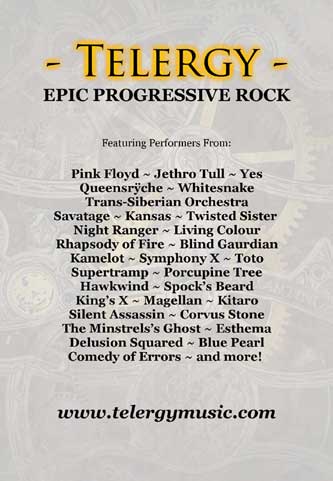 The story
of Hypatia was a suggestion from a friend. After doing a little
reading on the subject I decided it fit the framework for what I do
perfectly. So I dove right in.
The story
of Hypatia was a suggestion from a friend. After doing a little
reading on the subject I decided it fit the framework for what I do
perfectly. So I dove right in.
I do a lot of research for every album. Reading as much as I can find
and consulting with experts. The story of Goody Cole happened right
in my home town. So I had tremendous help and support from the local
historical society, which gave me access to hundreds of year’s
worth of documents, and lots of
background information. For Hypatia, I had the help of Australian
Professor Michael A.B. Deakin, who wrote the definitive biography
of Hypatia. He was very integral in helping me arrange the story in
a logical way.
I think the statement I try to make with every Telergy album is similar.
The way humans treat each other is often a travesty. The Israelites,
Goody Cole, Hypatia… These were all people who did nothing wrong.
Yet they were persecuted, enslaved, tortured and murdered. I would
like to hope that by examining these histories people can start to
examine what it truly means to be human, and stop hurting each other.
mwe3: How did you decide who you wanted to play on the Hypatia
tracks with you? For example Oliver Wakeman. Did Oliver perform his
part in the U.K.? There’s quite a lot of musicians, it’s
like a rock orchestra! How did you get them all in sync with the Hypatia
album?
Robert McClung: I choose each player based on their individual
skills. As I write I sometimes think “This part would be great
for……”. So I reach out to that person and ask if
they want to do it. Luckily for me, they usually say yes.
Yes, Oliver recorded his parts in his home studio in the U.K. And
it was a great honor to collaborate with him. Most of the musicians
who live out of my area recorded their parts in their own studios,
or in studios near them. Musicians who live local to me recorded at
my studio here in New Hampshire.
Getting everyone “in sync” is a challenge. But technology
is on our side. I send out sheet music, in the form of PDF files,
and audio files, WAV files, of the basic tracks. The musicians record
their segments and send back the audio files of their part. Then I
mix it all together. It’s like musical legos.
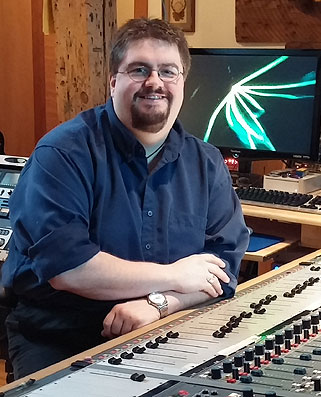 mwe3:
What does Hypatia, the person, mean to you? It seems like bad things
happened to both Goody Cole and Hypatia. Is that par for the course
for Telergy albums? Focusing on the underdogs and the persecuted,
Telergy always likes the big biblical productions so maybe you should
take Hypatia to Broadway.
mwe3:
What does Hypatia, the person, mean to you? It seems like bad things
happened to both Goody Cole and Hypatia. Is that par for the course
for Telergy albums? Focusing on the underdogs and the persecuted,
Telergy always likes the big biblical productions so maybe you should
take Hypatia to Broadway.
Robert McClung: Yes. Hypatia, Goody Cole, and the Israelites
were all persecuted in horrible ways. I just try to pick stories that
fit well within the style of music I write, which is big and epic
in scope. So the story requires a good deal of drama. I don’t
think a story about people who only had happy good things happen to
them would make a good rock album.
Yeah, a live stage production of any of the Telergy albums would be
really cool. Wish I had the money and connections to make that happen.
mwe3: Tell us about your start on the guitar. What was your
first guitar and in what order did you learn all the other instruments
that you play on the CD? It sounds like you have a pretty extensive
knowledge of music harmony too. Did you do all the orchestrations
on the Hypatia album?
Robert McClung: I was given my first guitar by my grandfather
when I was ten years old. It was a Martin acoustic. My first electric
was a Synsonics with a built in amplifier I bought at Toys ‘R’
Us with money I earned from my paper route. I’m sure my neighbors
just loved hearing me walking down the street blasting out AC/DC riffs
on it! (lol)
No idea what order I learned things in. Guitar was first. I had drum
lessons in grade school. Picked up some piano then too. Bass, mandolin
and violin came soon after. Most of the instruments I learned out
of necessity. A part had to be done and there was nobody to do it.
So I just picked up the instrument and figured it out myself.
For me, all stringed instruments are essentially the same. Just variations
on the same Pythagorean theory. You have a string stretched across
two points tuned to a certain pitch. Placing your finger on the string
at different points and plucking or bowing it changes the notes. The
size of the instrument, the number of strings and the tuning may change
from one instrument to another. But the basic concept is all the same.
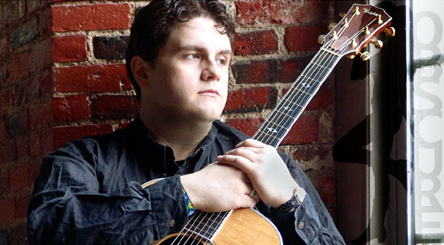 Yes, I have
an extensive knowledge of music theory. I make my living as a music
teacher in both public and private schools. For me, knowledge of music
theory is essential to what I do. Not just as a composer, but as a
communicator. I have to communicate with dozens of other musicians
who play many different instruments. Without the ability to read music
and understand theory, I wouldn’t be able to communicate my ideas
to them.
Yes, I have
an extensive knowledge of music theory. I make my living as a music
teacher in both public and private schools. For me, knowledge of music
theory is essential to what I do. Not just as a composer, but as a
communicator. I have to communicate with dozens of other musicians
who play many different instruments. Without the ability to read music
and understand theory, I wouldn’t be able to communicate my ideas
to them.
I do as much of the orchestrations as I can myself. But I don’t
play every instrument in the orchestra. I could do it all with synths
and samples, but real people always sound better. Special acknowledgment
here to all the incredible orchestra musicians I have the pleasure
of working with. They may not be as famous as some of the other people
who are involved in Telergy projects, but they are every bit as important!
But whether I’m playing at all is irrelevant. In fact, there
are a couple Telergy tracks I’m not playing on whatsoever, even
thought I composed them. It’s all about what’s best for
the music. If I’m in the way I’m happy to step aside and
let others shine.
mwe3: What guitars did you record the Hypatia album
with? What are your favorites guitars, amps and strings and effects
also? What lap steel guitar are you playing on the CD? What keyboards
are you into playing these days too?
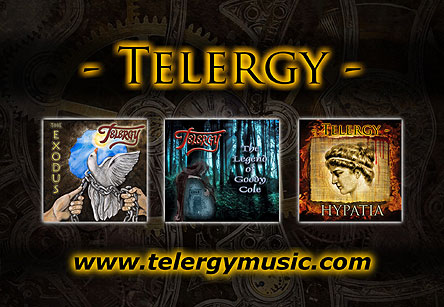 Robert
McClung: For acoustic guitars, I play Taylors exclusively. I have
five of them. Three six strings, a twelve string and a nylon string.
They are incredible. For electrics there’s a bunch of things.
Several highly modified Fender Strats, a Paul Reed Smith, a few Deans,
including a 12 string electric, a Washburn 7 String and a beautiful
Epiphone 335 hollow body. Each guitar has its own feel and color.
So I just try to pick the one that fits the part the best.
Robert
McClung: For acoustic guitars, I play Taylors exclusively. I have
five of them. Three six strings, a twelve string and a nylon string.
They are incredible. For electrics there’s a bunch of things.
Several highly modified Fender Strats, a Paul Reed Smith, a few Deans,
including a 12 string electric, a Washburn 7 String and a beautiful
Epiphone 335 hollow body. Each guitar has its own feel and color.
So I just try to pick the one that fits the part the best.
The lap steel is an old Fender. There’s also a Spector five string
bass, a Fender Precision bass, a few mandolins, a few ukuleles, several
violins, including my custom made Mark Wood six string electric viper,
a balalaika and a sitar. It’s hard to walk through the house
without bumping into an instrument.
For amps I use a use a Mesa Boogie DC-5 and a Marshall JCM-800. I
run those in conjunction with various Line 6 amp mods. I like a Bogner,
a Vox AC-30 and a Roland Jazz Chorus. For effects, I primarily stick
to the Line 6 for chorus, delay, ‘verb stuff these days. I have
a Rocktron Replifex but it’s been collecting dust for a while.
I also use a Pro-Co Rat, an Ibanez Tube Screamer, a Crybaby wah, a
Rocktron talk box, a Digitech Whammy pedal and an Ebow. For strings
I use D’addario exclusively. Various gauges.
For keyboards I’m not nearly as interesting. I just use one universal
MIDI controller keyboard, tied into various VST sample synths. I have
hundreds of them. Too many to mention…
mwe3: Who and what were some of your most important musical
and other influences? What era of progressive rock and rock did you
grow up in and what bands kind of spurred you on musically, to want
to make your own music?
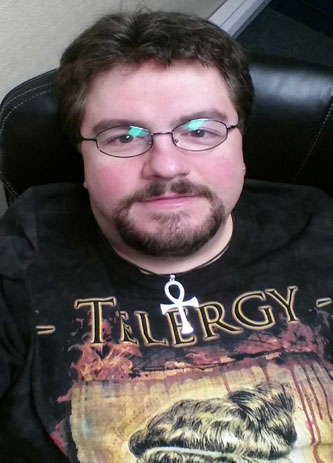 Robert
McClung: I was born in 1973. So my first introduction to prog
was the bands from that era. Genesis, YES, King Crimson, Rush, Pink
Floyd, Hawkwind and Kansas. When I was in high school I got into metal.
Which is where influences like Queensryche, King’s X, Dream Theater
and Savatage came in. It’s quite a thrill to now work with musicians
involved with those bands.
Robert
McClung: I was born in 1973. So my first introduction to prog
was the bands from that era. Genesis, YES, King Crimson, Rush, Pink
Floyd, Hawkwind and Kansas. When I was in high school I got into metal.
Which is where influences like Queensryche, King’s X, Dream Theater
and Savatage came in. It’s quite a thrill to now work with musicians
involved with those bands.
I guess I wanted to make my own music because I had something to say?
And much of what gets popular on the radio is usually pretty dull.
I always had a vision in my mind for something much grander. More
intricate. More powerful. A lot of people thought I was nuts when
I told them what I wanted to do. But here we are doing this interview,
so I guess I wasn’t that crazy after all?
mwe3: What are some of high points for you on Hypatia? For
instance on track 2, “Philosopher” is quite effective at
setting the album’s tone. It almost sounds like a George Martin
type James Bond theme or something! Very dramatic and action sounding
stuff. Was Hypatia an astronomer too? It’s amazing how she knew
about the planets in 400 AD! Who played with you on that track?
Robert McClung: Asking me to pick favorites is a little bit
like asking what child I like best! (lol) Yes, “Philosopher”
is great. I think I also did well with “The Burning Of The Library
Of Alexandria”. The rock band and the orchestra fuse together
really well on that track.
I think if I had to pick an absolute favorite it would be “Martyr”,
the cello duet. We recorded it live, in a hundred year old cathedral,
at midnight. To hear two amazing cellists like Kristen Miller and
Adam Nunes playing a piece I wrote in that setting was magical for
me.
Yes, Hypatia was indeed an astronomer. She studied ellipses and the
movements of the planets. Revolutionary stuff for the time, and way
ahead of other scientists, like Copernicus, who get the credit for
things she may have actually discovered centuries before. Such a shame
that so much of her work was lost.
mwe3: The Hypatia album art by Ed Unitsky is very cool
too. How about that back cover art? I presume that’s alluding
to “The Burning Of The Library Of Alexandria”. Is that a
painting? It’s harrowing stuff. Seems like the human race has
always had wars.
 Robert
McClung: Yes, it’s a painting, by Thomas Cole called “The
Course Of Empire”. It’s on display at the New York Historical
Society.
Robert
McClung: Yes, it’s a painting, by Thomas Cole called “The
Course Of Empire”. It’s on display at the New York Historical
Society.
Ed Unitsky did an amazing job with the artwork. I’m so glad I
was able to get him involved. The first two Telergy album covers were
done by my now ex-wife. She is very talented and did a great job.
The cover of The Exodus was all hand painted. And the cover
of The Legend of Goody Cole is very haunting. The shrouded
woman leaning over the stone on the cover is actually her.
But when it came time for artwork for Hypatia, she was out
of the picture and I needed to find someone else. Ed came in and just
nailed it. The parchment, the drawing, the fire, the new logo. It’s
perfect. I think people wanted the t-shirts with Ed’s art just
as much as they wanted the actual album! (lol) I look forward to having
Ed do future Telergy album covers. He’s the best!
mwe3: In addition to the guitars, you have a very intriguing
group of instruments that you play yourself including lap steel and
sitar. What tracks did you feature those instruments on? How hard
is it really to play the sitar? How many instruments do you play?
Robert McClung: The sitar can be heard on “Teacher”,
backing up the Oud, played by Mac Ritchey. The lap steel is on another
section of that same tune.
Yes, an original acoustic Indian sitar is very hard to play. Just
holding it properly is challenging and cumbersome. But I play a more
modern electric sitar. Similar to a guitar, but with a Jawari sitar
bridge and many extra drone strings added. They were originally made
in the 1960’s by Danelectro, due to the popularity of songs using
a sitar recorded by the Beatles and Rolling Stones. Over the years
few different companies like Jerry Jones and Rogue have copied the
design.
I’ve lost track of how many instruments I play. I’ll try
anything I can get my hands on. And if I can’t figure it out,
I can always find someone else to do it.
mwe3: What interests do you have outside of music and what
other plans are you looking at in 2016?
 Robert
McClung: I have little time for anything outside of music. I work
a lot and I don’t even own a couch or a television. But when
I do find a spare moment I enjoy movies, theater, museums, flea markets,
fairs... But those moments are few and far between.
Robert
McClung: I have little time for anything outside of music. I work
a lot and I don’t even own a couch or a television. But when
I do find a spare moment I enjoy movies, theater, museums, flea markets,
fairs... But those moments are few and far between.
I’ll begin work on another Telergy album soon. Right now I’m
working with a few historians on finding the right story. Once I have
that set in stone I’ll begin the process. Can’t say when
it might be done. I’m in no hurry. It will be done whenever it
is done. These things can’t be rushed…



